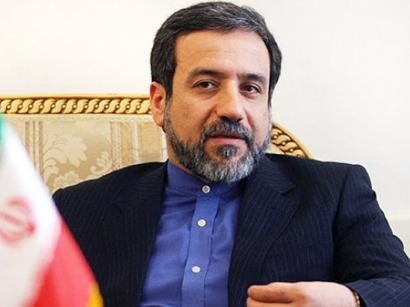Baku, Azerbaijan, Jan.20
By Dalga Khatinoglu - Trend:
Iran's top nuclear negotiator Abbas Araqchi says that the "The EU Council of Ministers will hold a meeting to implement the nuclear accord with Iran and make some adjustments to the sanctions imposed on Iran", country's Mehr news agency reported on Jan. 20.
According to Araqchi who serves as the Deputy of Iran's Foreign Minister as well, Iran has stopped enriching uranium to 20-percent pure level since Jan. 20, for its first step within the framework of the joint action plan, based on the nuclear agreement with P5+1 group.
Araqchi also said that the steps of Iran and P5+1 based on Geneva deal (signed on Nov. 24, 2013, went into effect on Jan. 20, 2014), will be implemented gradually.
Based on nuclear agreement, Iran should halt production of 20-percent enriched uranium and disable the centrifuges used to produce it, as well as neutralize its near-20-percent enriched uranium stockpile, according to a report released by White House on Jan.16.
Iran committed to refrain from enriching uranium in nearly half of the installed centrifuges at its Natanz site, and three-quarters of centrifuges at its Fordow site, and also limit centrifuge production, which is needed to replace damaged machines.
Tehran also took obligation to refrain from building additional enrichment facilities and advancing research and development of enrichment and avoid from commissioning, fueling or adding reactor components to its Arak reactor and halt production and additional testing of fuel for the reactor.
Iran's commitments also include refraining from building a facility capable of reprocessing, which allows Iran to separate plutonium from used nuclear fuel, which could be used to make nuclear bombs.
Once the IAEA has confirmed Iran is implementing its commitments, in return the P5+1 and EU have committed to do the following on the first day of implementation:
* Suspend the implementation of sanctions on Iran's petrochemical exports and Iran's imports of goods and services for its automotive manufacturing sector.
* Suspend sanctions on Iran's import and export of gold and other precious metals, with significant limitations that prevent Iran from using its restricted assets overseas to pay for such purchases.
* License expeditiously the supply of spare parts and services, including inspection services, for the safety of flight of Iran's civil aviation sector.
* Pause efforts to further reduce purchases of crude oil from Iran by those countries that still do such business with Islamic Republic.
* Facilitate the establishment of a financial channel intended to support humanitarian trade that is already permitted with Iran and facilitate payments for UN obligations and tuition payments for Iranian students studying abroad.
* Modify the thresholds for EU internal procedures for the authorization of financial transactions with Iran.
The P5+1 and EU have also committed to take certain actions to facilitate Iran's access to $4.2 billion in restricted Iranian funds on a set schedule at regular intervals throughout the six months.
Access to a small portion of these funds will be linked to Iran's progress in completing the dilution process for near-20% enriched uranium.
Iran will not have access to the final installment of the $4.2 billion until the last day of the six-month period.






